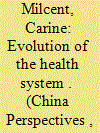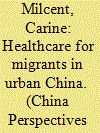| Srl | Item |
| 1 |
ID:
151563


|
|
|
|
|
| Summary/Abstract |
China’s public health system has gone through a number of development stages. This paper aims at showing how, from its inception as a hierarchical system, the healthcare system then lost its structure, to finally give birth to a focalised system where the first point of entry in the treatment process has become the hospital, in particular the healthcare establishments that offer the most reliable standards of care. These days, the widely-acknowledged inefficiencies of the healthcare system have led to a climate of violence between medical staff and their patients, caused by the overwhelming demand that hospitals must bear, the ambiguous status of public establishments, financial benefits and other perks for medical staff, as well as the medical staff’s civil servant status, and the implications thereof. Policies to foster the development of primary health centres are struggling to gain traction, while digital healthcare offers promising solutions and is developing fast.
|
|
|
|
|
|
|
|
|
|
|
|
|
|
|
|
| 2 |
ID:
102245


|
|
|
|
|
| Publication |
2010.
|
| Summary/Abstract |
How can healthcare access for Chinese migrants be improved? Migrant workers face two types of healthcare-access exclusion in the workplace: one is financial (because of their income) and the other is social (because of the lack of social networks in the city). We use 2006 data from a survey of rural migrant workers conducted in five of the most economically-advanced cities. The empirical findings support the hypothesis of a return to the hometown for migrant workers with poor health. Apart from residency permits and income, the social integration of migrant workers is also found to be a decisive factor in healthcare access.
|
|
|
|
|
|
|
|
|
|
|
|
|
|
|
|